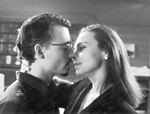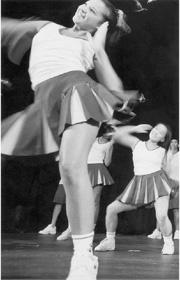THRILLERS AREN’T high art. At least that’s what we’re ordinarily told by the Oscar voters—who uncharacteristically bestowed a Best Picture nomination on a certain overrated 1999 thriller starring Bruce Willis. But if any director should scare the AMPAS into submission, it’d be Roman Polanski, whose long career has been devoted to taut, disturbing works like Rosemary’s Baby and Repulsion. Returning after a six-year hiatus, Polanski resumes his fascination with the occult in The Ninth Gate—and he does so with plenty of panache.
THE NINTH GATE
directed by Roman Polanski
with Johnny Depp, Frank Langella, and Lena Olin opens March 9 at Meridian, Metro
As rare books expert Dean Corso, Johnny Depp hasn’t looked more suave. He wears a trim goatee, glasses, and a bit of silver hair at the temples. He smokes and drinks Johnny Walker black label. But the sense of refinement all but disappears when Corso starts wheeling and dealing. At times, he and a cohort sound more like NYC cab drivers than rare book dealers, peppering their conversations with bursts of “Son of a bitch!” Hardly the good guy, Corso is motivated less by literature than profit margins, and he swiftly cons the relatives of an elderly, paralyzed collector, taking a first-edition copy of Don Quixote for a fraction of its worth.
But the con is conned by Boris Balkan (Frank Langella), a book collector who harbors an obsession for texts on demonology. Balkan hires Corso to track down two copies of The Nine Gates, a book rumored to have been written by Satan himself. Balkan owns the third copy and wants to make sure that his is the original. Or so he says. Corso’s mission takes him to France and Spain, and turns out to be a scavenger hunt more dangerous than he bargained for. Enter a mysterious woman played by Polanski’s wife Emanuelle Seigner. Tall and beautiful in an affected I-don’t-give-a-damn manner, this nameless character becomes Corso’s guardian angel, appearing at just the right moments—sexual and otherwise.
AS IN THE PAST, Polanski puts considerable effort into creating mood. Suspenseful music and dark lighting descend upon each scene like a storm cloud. Even the opening credits are ominous, as names zoom forward on the screen a little too quickly, like a novice player losing control of a video game. Manhattan as seen through Balkan’s windows looks like Gotham City, gray and decadent. Then there are those finer details—the sheen of gilded books, echoes in an empty mansion, the buzzing of flies as Corso utters “Lucifer.” The look of the characters is as meticulously tailored: Quirky twin book sellers have whiskers as thick as brooms; a wheelchaired baroness points with the stub of her amputated hand; and above all, Langella—a large man with bright white hair—cuts a fearsome figure in a pressed navy blue pinstriped suit and big owlish glasses. His Balkan is a refined boogeyman, taken to hanging out at chic European addresses, a Gothic Merlin in an agnostic world. If he’s given to violence, he does so with style: There’s a fabulous public strangling scene after which Balkan kicks the corpse across the floor.
Polanski has been trying to make a film about the Holocaust for the past 10 years and is anxious to do something more personal than such supernatural fare. In the New York Times, the 66-year-old director is quoted as saying that Gate is fun but doesn’t really say anything important. He should give himself more credit. The Ninth Gate may be a minor work by a consummate artist, but it’s a damn good one at that.







